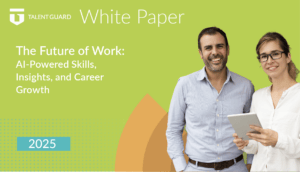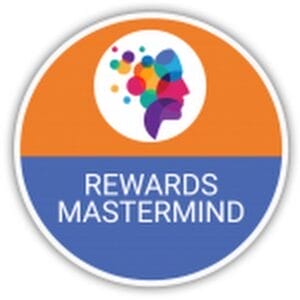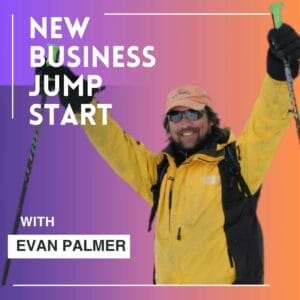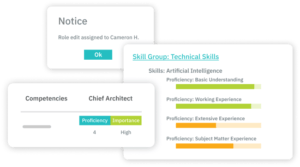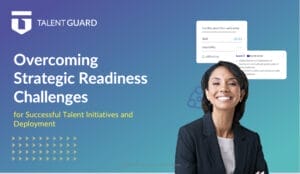It’s time to take your talent management to a new level
Learn from the pros who live and breathe this stuff.
Whitepapers, Webinars and Other Resources
Fortegra Achieves Exceptional Workforce Engagement
"Using TalentGuard's platform gave Fortegra better data insights and analytics. This improved their decision-making efficiency by 40%. It helped them make smarter talent management choices, leading to greater success for the organization."
Workforce Agility: AI-Powered Skills and Career Growth
The future of work demands a dynamic, skills-based approach to workforce management. Organizations that rely on outdated job architectures, static career paths, and traditional succession planning risk falling behind in an increasingly competitive market. AI-powered talent strategies offer a solution by continuously evolving skill taxonomies, aligning workforce capabilities with business needs, and empowering employees with personalized career growth opportunities.
The Powerful Relationship Between Culture and Growth
Listen to the Podcast with Linda Ginac and David Altounian to learn about the powerful relationship between culture and growth.
Remote, Hybrid and AI Powered Futures
This episode discuss the new world of work and trends occurring in the market with the growth and adoption of AI.
State of Funding For Growth Companies
This episode is the audio from the featured panel at the 2024 C-Suite Summit and Industry Think Tank. The discussion is about the state of funding for Small and Mid-Sized tech companies.
How to Pivot with Unbreakable Faith with Linda Ginac
In this INNW Interview, meet Linda, a fearless and passionate technology leader, CEO, and chairwoman of TalentGuard. She always believes in human potential, and everyone deserves to be in a role where they’re appreciated, respected, while shining their own lights and unique talents to make an impact within their role.
Creating a Skills Forward Organization With Linda Ginac
Linda Ginac, Founder and CEO of TalentGuard, discusses the importance of developing a skills-centric approach within organizations.
Talking Talent and Entrepreneurship With Linda Ginac
Linda shares her journey as an entrepreneur and discusses how TalentGuard is transforming the way corporations find, attract, and retain talent.
Transform Talent Insights into Personalized Upskilling
This episode is a must-listen for HR and business leaders looking to unlock the potential of their workforce through cutting-edge technology and innovative talent strategies.
When You’re Married and in Business Together
When You're Married and in Business Together with Linda & Frank Ginac: Insights on balancing love, leadership, and entrepreneurship!
Free Foundational Competency Spreadsheet
Unlock the potential of your workforce with our Free Foundational Competency Spreadsheet.
Overcoming Skills-Readiness Challenges in Talent Strategy
Explore how strategic readiness can transform your talent initiatives! Download the Webinar and Whitepaper.
How to Use Career Paths to Support IT Talent
The IT industry is rapidly evolving, requiring new competencies, certifications, and career progressions to meet emerging demands. Businesses face major skill shortages due to technological advancements, and manual management of competencies and job roles is no longer sufficient. TalentGuard provides best practices to help organizations empower IT professionals by building new skills, closing learning gaps, and growing in their roles.
Improving Skills Transfer Rates in Organizations
Improving skills transfer rates is vital for maximizing training ROI and maintaining organizational competitiveness. Traditional methods often fail to apply new skills practically, resulting in inefficiencies and job dissatisfaction. Key barriers include irrelevant training, inadequate follow-up, outdated methods, and insufficient managerial support. Effective skills transfer enhances employee competency, satisfaction, and growth, boosting overall productivity and innovation. Leveraging advanced technology and adopting strategies such as fostering supportive learning environments, providing practice opportunities, and aligning training with job requirements can significantly improve skills transfer and organizational success.
6 Steps to Improve Employee Retention and Engagement
This presentation by TalentGuard outlines a six-step plan to enhance employee retention and engagement by addressing turnover through detailed data analysis and fostering a "Culture of Empowerment." Key actions include overhauling talent assessments, implementing career pathing programs, and optimizing communication to improve job satisfaction and reduce turnover.

